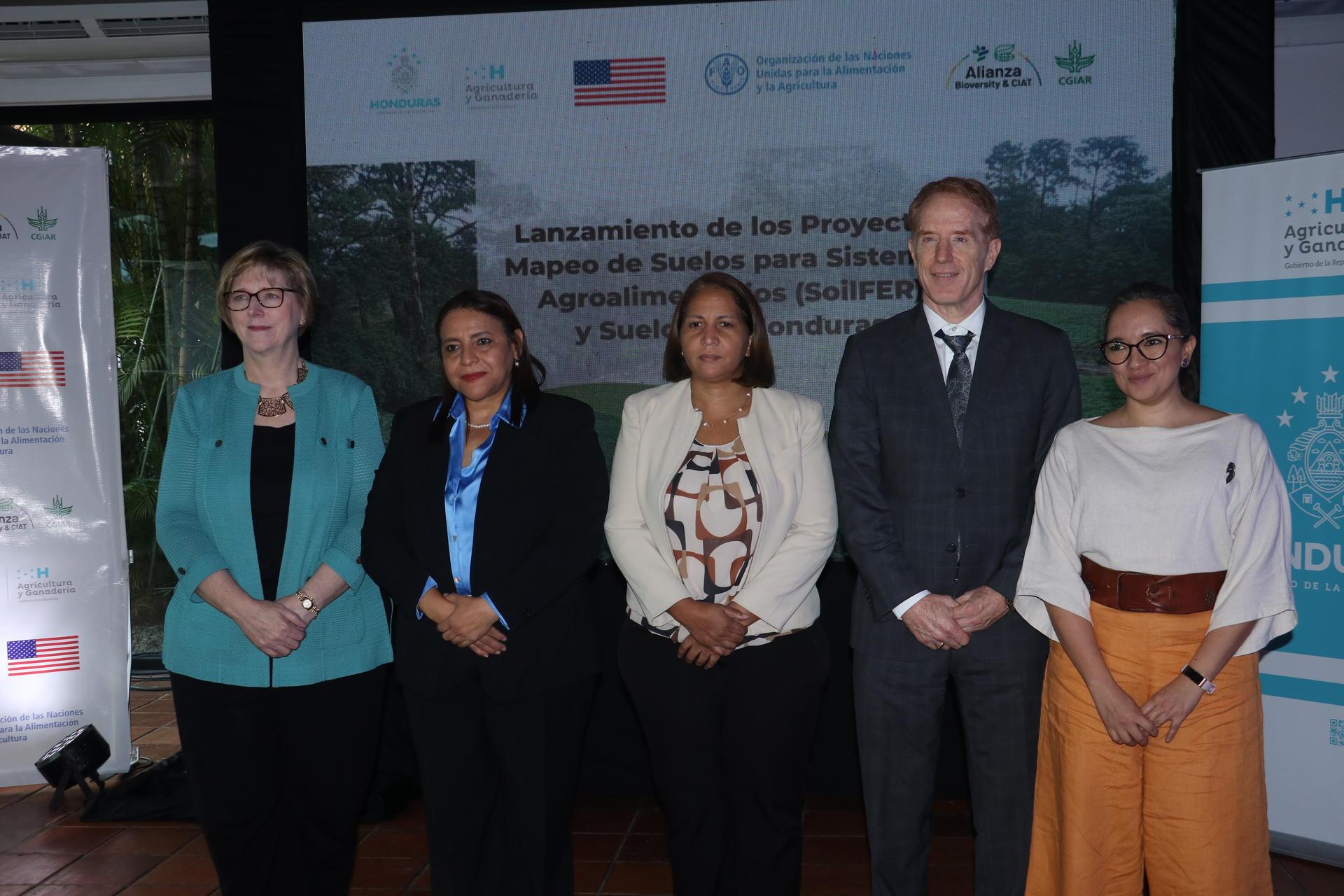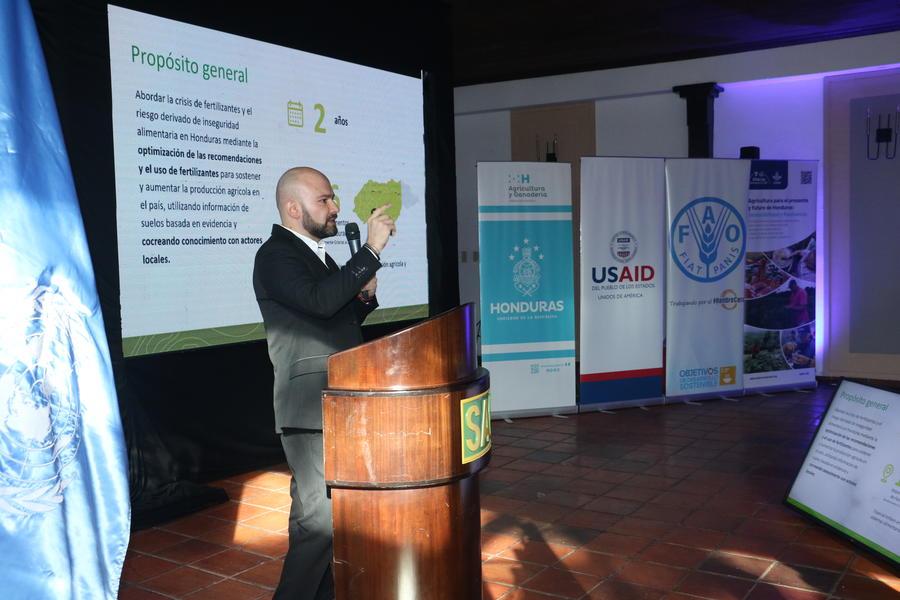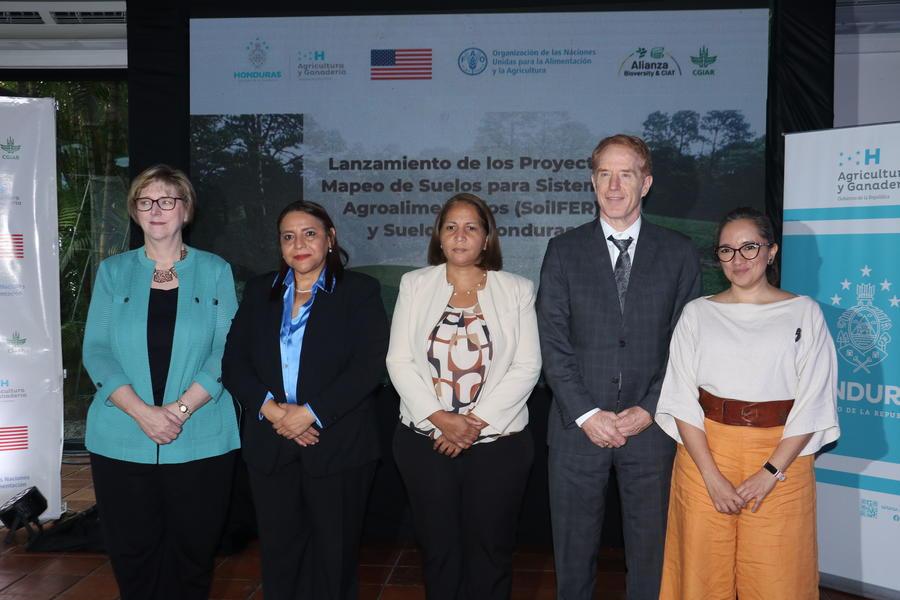Press and News Projects Launched to Protect Soil and Boost the Honduran Agricultural Sector

With funding from the U.S. Government and implementation support from the Alliance and FAO, Honduras's Secretariat of Agriculture and Livestock will develop soil fertility mapping to improve agricultural productivity in Honduras.
Tegucigalpa. The Secretariat of Agriculture and Livestock launched the projects 'Mapping for Resilient Agrifood Systems in Central America and Sub-Saharan Africa' (SoilFER) and 'Soils of Honduras', as avenues to promote agricultural production through sustainable soil management.
Through the Secretariat, the launch of SoilFER and Soils of Honduras is an important achievement for the Government of Honduras. Both projects will work in close collaboration with different national stakeholders to avoid redundancies or overlaps, maximizing the effectiveness of their efforts. Their joint mission is to generate an enabling environment for the sustainable management of soils.
These initiatives will be implemented with the technical and scientific support of the Food and Agriculture Organization of the United Nations (FAO), Catholic Relief Services (CRS), and the Alliance, with the financial and conceptual support of the Government of the United States of America through the United States Agency for International Development (USAID) and the Department of State. Both FAO and the Alliance seek to promote the adoption of sustainable agricultural practices and efficient soil management in the country.



SoilFER
The SoilFER Project, which in Central America also benefits Guatemala, aims to carry out a detailed mapping of soil health and fertility, allowing the government and stakeholders to make strategic decisions at the national level on policies, investments and incentives to increase soil health and productivity. It will also facilitate the establishment of the Honduran Soil Alliance (AHS), the Honduran Soil Laboratory Network (HOSOLAN) and the Honduran Soil Information System (HoSIS), through a participatory and inclusive process.
The mapping will also lead to the development of decision support systems for soil fertility through the use of the FerSIS app, and the implementation of the Soil Doctor Program in close alliance with CRS, as well as the strengthening of installed capacities for the safe production of biofertilizers and bio-stimulants.
This mapping exercise will be accompanied by a strengthening of institutional capacities in soil analysis and interpretation of data and derived information. A soil monitoring system will also be established to adapt decisions to changing crop conditions, climate or socio-economic factors. These maps will be combined with existing territorial prioritization maps.
Soils of Honduras
This project will address the fertilizer crisis and mitigate food insecurity in Honduras. Among its main objectives is the generation of a digital fertility map, improvement of fertilizer use efficiency, the development of a web-based information system and the promotion of knowledge co-creation.
Suelos de Honduras will also focus on the optimization of agricultural production through the use of information based on scientific evidence and active collaboration with local stakeholders, with Honduras's Secretariat of Agriculture and Livestock as the main actor and implementing partner. With this, it is expected that the Digital Fertility Map will be a key support tool to improve decision making and efficiency in fertilizer use, involving both the public and private sectors.
For nearly 30 years, the Alliance has supported the improvement of smallholder productivity and the transformation of food systems in Honduras, providing science-based solutions and technical assistance through the implementation of programs and projects that strengthen the capacities of farmers, local and national governments and other stakeholders in the promotion of more sustainable agriculture, integrated natural resource management and the development of adaptation and mitigation measures in the face of climate change.
By leading this joint effort, the Secretariat demonstrates its dedication to the positive transformation of the sector, moving it towards sustainability, productivity and resilience. This commitment will not only strengthen food security in the country, but will also lay the foundation for a more equitable and efficient agricultural model.
